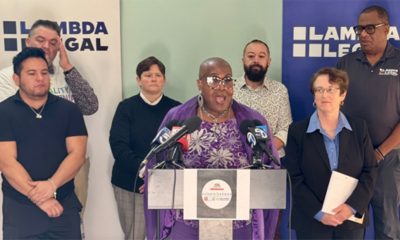World
Out in the World: LGBTQ+ news from Europe & Asia
LGBTQ+ news stories from around the globe including Jordan, France, Scotland, Britain & Poland

JORDAN
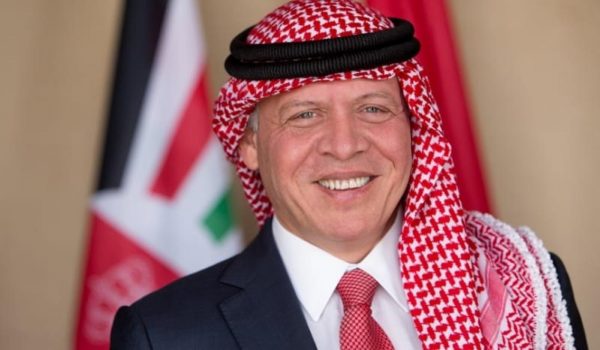
BEIRUT, Lebanon – The government of Jordanian King Abdullah have systematically targeted lesbian, gay, bisexual, and transgender (LGBT) rights activists and coordinated an unlawful crackdown on free expression and assembly around gender and sexuality, Human Rights Watch (HRW) said in a report released earlier this month.
In its December 4 report, HRW documented cases in which the Kingdom of Jordan’s General Intelligence Department (GID) and the Preventive Security department of the Public Security Directorate interrogated LGBT activists about their work, and intimidated them with threats of violence, arrest, and prosecution, forcing several activists to shut down their organizations, discontinue their activities, and in some cases, flee the country.
Government officials also smeared LGBT rights activists online based on their sexual orientation, and social media users posted photos of LGBT rights activists with messages inciting violence against them.
“Jordanian authorities have launched a coordinated attack against LGBT rights activists, aimed at eradicating any discussion around gender and sexuality from the public and private spheres,” said Rasha Younes, senior LGBT rights researcher at Human Rights Watch. “Security forces’ intimidation tactics and unlawful interference in LGBT organizing have driven activism further underground and forced civil society leaders into an impossible reality: severe self-censorship or fleeing Jordan.”
Three activists said the Amman governor interrogated them after they preemptively cancelled the screening of a film depicting gay men. Two LGBT organization directors said that because of official intimidation, they were forced to close their offices, discontinue their operations in Jordan, and flee the country.
One activist said Preventive Security officers made him sign a pledge that he would report all his venue’s activities to the governor. Another activist reported being targeted online while social media users called for him to be burned alive.
One of the few LGBT rights activists who has remained in Jordan described her current reality: “Merely existing in Amman has become terrifying. We cannot continue our work as activists, and we are forced to be hyperaware of our surroundings as individuals.”
More recently, in October 2023, an LGBT rights activist said he was summoned for investigation by the intelligence agency. During the interrogation, the activist said intelligence officers searched his phone, intimidated him, and threatened him with a travel ban, while asking personal questions about his sexual orientation and sexual relations with other men. After three hours of questioning, the activist said the officers told him he could leave.
“They [Jordanian authorities] invest in intimidation to destroy our minds and isolate us,” the activist said. “Their tactic is to target us mentally, leaving no evidence of our torment behind.”
Jordan’s constitution protects the rights to nondiscrimination (article 6), the right to personal freedom (article 7), and the right to freedom of expression and opinion (article 15).
The International Covenant on Civil and Political Rights, to which Jordan is a state party, provides that everyone shall have the right to freedom of expression, assembly, and association. The ICCPR, in its articles 2 and 26, guarantees fundamental human rights and equal protection of the law without discrimination.
The United Nations Human Rights Committee, which interprets the covenant, has made clear that discrimination based on sexual orientation and gender identity is prohibited in upholding any of the rights protected by the treaty, including freedom of expression, assembly, and association.
FRANCE
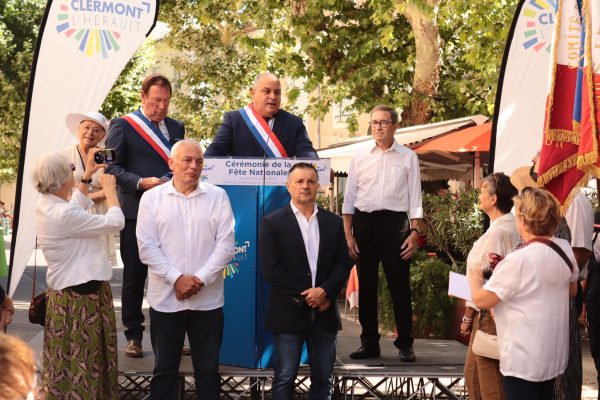
PARIS, France – Legislation that was introduced last month by the openly gay Socialist Senator Hussein Bourgi to acknowledge the French state’s responsibility in the criminalization and persecution of homosexuals between 1945 and 1982 was adopted.
However, the section of bill that called for compensation of the victims of French homophobic laws, in effect during that period by offering them a lump sum of €10,000 Euros [10,752.75 USD], was not approved.
Speaking with various French media outlets, Bourgi, who authored the bill, said: “It is high time to bring justice to the living victims of legislation which served as the basis for a politics of repression with brutal and punishing social, professional and familial consequences.”
Agence France-Presse reported:
Bourgi’s text focuses on a 40-year period following the introduction of legislation that specifically targeted homosexuals under the Nazi-allied Vichy regime. The 1942 law, which was not repealed after the liberation of France, introduced a discriminatory distinction in the age of consent for heterosexual and homosexual sex, setting the former at 13 (raised to 15 at the Liberation) and the latter at 21.
Some 10,000 people – almost exclusively men, most of them working-class – were convicted under the law until its repeal in 1982, according to research by sociologists Régis Schlagdenhauffen and Jérémie Gauthier. More than 90% were sentenced to jail. An estimated 50,000 more were convicted under a separate “public indecency” law that was amended in 1960 to introduce an aggravating factor for homosexuals and double the penalty.
“People tend to think France was protective of gay people compared to, say, Germany or the UK. But when you look at the figures you get a very different picture,” said Schlagdenhaufen, who teaches at the EHESS institute in Paris.
“France was not this cradle of human rights we like to think of,” he added. “The Revolution tried to decriminalise homosexuality, but subsequent regimes found other stratagems to repress gay people. This repression was enshrined in law in 1942 and even more so in 1960.”
The legislation won the backing of Éric Dupond-Moretti, Minister of Justice for the government of President Emmanuel Macron. However, Dupond-Moretti agreed with the removal of the compensation provision by the right-wing and center senatorial majority. Dupond-Moretti justified this choice noting concerns over “legal difficulties,” telling French magazine Le Monde that “putting into practice” of this compensation measure “appears extremely complex” due to the difficulty of providing proof of an old conviction and its execution.
The Justice Minister added “It was not the law which was responsible for this harm” but “French society, homophobic in all its components at the time” adding, “This is not the fault of the Republic. The law of memory is enough.”
The bill must now be taken up by the lower house, the National Assembly, to be passed and then adopted.
SCOTLAND
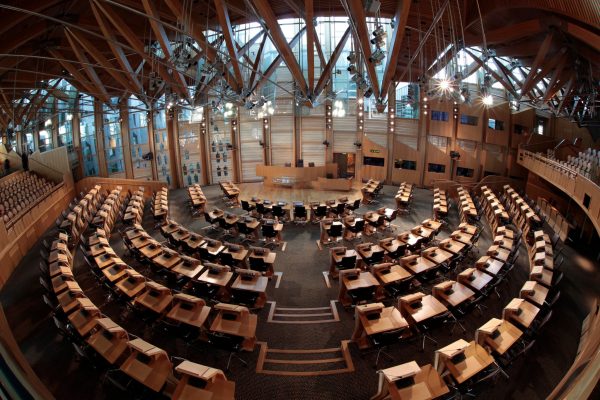
EDINBURGH, UK – The Court of Session in Edinburgh has ruled that the UK government of Prime Minister Rishi Sunak acted within the law by invoking Section 35, which blocked the measure passed by the Scottish Parliament, that would have make it easier for transgender people to change their legally-recognized sex on documents.
The actions by Scottish Secretary Alister Jack, with Prime Minister Sunak’s backing kept the act from receiving the signature of King Charles III and becoming law.
The Gender Recognition Reform bill was introduced by the Scottish government to Holyrood (parliament) in the Spring of 2022 was passed in a final 86-39 vote days before Christmas of 2022. The sweeping reform bill modifies the Gender Recognition Act, signed into law in 2004, by allowing transgender Scots to gain legal recognition without the need for a medical diagnosis.
The measure further stipulates that age limit for legal recognition is lowered to 16.
In a statement released in January of this year, Jack said:
“After thorough and careful consideration of all the relevant advice and the policy implications, I am concerned that this legislation would have an adverse impact on the operation of Great Britain-wide equalities legislation.
“Transgender people who are going through the process to change their legal sex deserve our respect, support and understanding. My decision today is about the legislation’s consequences for the operation of GB-wide equalities protections and other reserved matters.
“I have not taken this decision lightly. The Bill would have a significant impact on, amongst other things, GB-wide equalities matters in Scotland, England and Wales. I have concluded, therefore, that this is the necessary and correct course of action.”
The Scottish government sued Westminster in the Court of Session, Scotland’s highest civil court, arguing that Jack did not have “reasonable grounds” to block the bill. The BBC reported that in her ruling for the UK governments, Judge Lady Haldane dismissed the Scottish government’s appeal and said the block on the legislation was lawful.
Judge Haldance noted that Jack followed correct legal procedures when he made his decision to invoke section 35 and that the Scottish government had failed to show that he had made legal errors.
The judge wrote: “I cannot conclude that he (Mr Jack) failed in his duty to take such steps as were reasonable in all the circumstances to acquaint himself with material sufficient to permit him to reach the decision that he did.”
Lady Haldane also said that “Section 35 does not, in and of itself, impact on the separation of powers or other fundamental constitutional principle. Rather it is itself part of the constitutional framework.”
Stonewall UK, the nation’s largest LGBTQ+ advocacy group expressed its disappointment with Judge Haldane’s ruling in a statement released this past week:
“We’re disappointed that the Court of Session in Scotland has found in favour of the UK Government’s unprecedented decision to use Section 35 to block the Gender Recognition Reform Bill from Royal Assent. This Bill was one of the most debated in the Scottish Parliament’s history and was passed by a resounding majority of MSPs drawn from all major Scottish parties.
This unfortunately means more uncertainty for trans people in Scotland, who will now be waiting once again, to see whether they will be able to have their gender legally recognised through a process that is in line with leading nations like Ireland, Canada and New Zealand.
Whatever happens next in discussions with the UK and Scottish Governments on this matter, Stonewall will continue to press all administrations to make progress on LGBTQ+ rights in line with leading international practice.”
BRITAIN
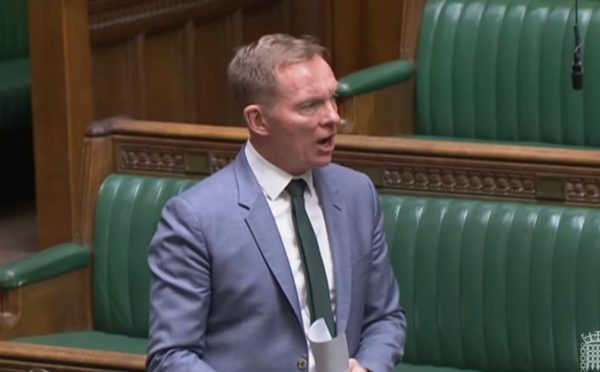
WESTMINSTER, UK – Anti-LGBTQ+ rhetoric used by British Equalities Minister Kemi Badenoch during her speech on the floor of the House of Commons on Dec. 6, prompted Labour MP Sir Chris Bryant, an openly gay lawmaker, to rise in opposition and declare her speech left him feeling unsafe.
The debate was triggered by the Equalities Minister claiming that the UK does not recognize self-ID from overseas countries for trans people, PinkNewsUK reported. In his retort to her statements, Bryant explained: “I feel, as a gay man, less safe than I did three years or five years ago.”
PinkNewsUK also noted that Bryant said: “Why? Sometimes because of the rhetoric that is used, including by herself [Badenoch] in the public debate.” He added that some MPs had cheered for Badenoch’s statements on the trans community, and for statements against gender-affirming care for trans people, which could lead to LGBTQ+ people feeling even less safe in the UK.
“Many of us feel less safe today, and when people over there cheer as they just did, it chills me to the bone, it genuinely does,” Bryant said.
She hit back with force, challenging him to identify which words precisely were so problematic. She later criticized the attempts of trans activists to use emotional blackmail to try to shut down debate.
The UK Government has updated the list of countries from which gender-certificates will be accepted.
Replying to Bryant, Badenoch said: “He says that my rhetoric chills him to the bone. I would be really keen to hear exactly what it is I have said in this statement or previously that is so chilling.” She added that the current Tory government had done work on “our HIV action plan” and “around trans healthcare”, as well as “establishing five new community-based clinics for adults in the country.”
“There is a lot that we are doing, so it is wrong to characterise us as not caring about LGBT people,” she said.
Bryant’s colleague, Sir Ben Bradshaw, also failed to get the better of Badenoch. He complained the UK had recently fallen in a set of international rankings on LGBTQ rights. She calmly pointed out that those rankings reward states that adopt the Stonewall-supported policy of self-ID and punish those who do not. To cheers from the Tory benches, she declared ‘Stonewall does not decide the law in this country,’ referring to Stonewall UK, the nation’s largest LGBTQ+ advocacy group.
POLAND
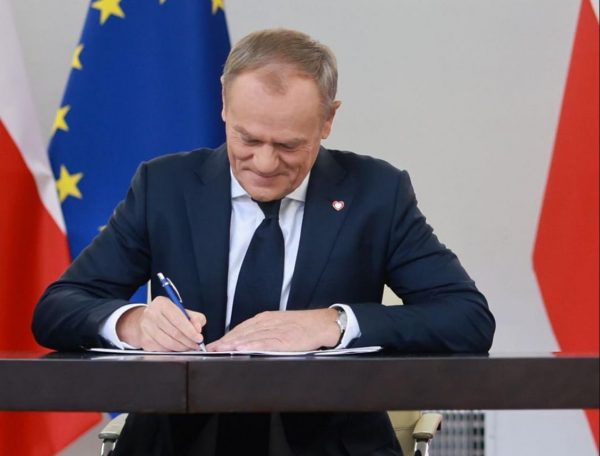
WARSAW, Poland – In a turn of events Monday, the Sejm, lower house of the national legislature of Poland, elected Donald Tusk as the new prime minister after Prime Minister Mateusz Morawiecki failed to win a vote of confidence by lawmakers in his government.
248 MPs voted for the election of Tusk as prime minister, 201 were against and no one abstained in the 460-seat lower house of parliament.
“This is a truly wonderful day, not only for me, but for all those who have deeply believed for many years that things will get even better, that we will chase away the darkness, that we will chase away evil,” the 66-year-old new prime minister told the Sejm after his election.
There had been considerable turmoil in the Polish government, particularly in the Sejm, as many accused the ruling conservative right-wing PiS (Law and Justice Party) of Jarosław Kaczyński, who until last month held the post of Deputy Prime Minister, of leading the country backwards into an authoritarian state.
The PiS lost their parliamentary majority in the critical elections this past October after a larger proportion of the country’s 18-29 year-olds had turned out to vote than over-60s and election officials said that turnout was probably 72.9%, the highest since the fall of communism in 1989.
Voter anger had steadily risen over erosion of women’s reproductive rights eroded and Polish LGBTQ+ people who had faced a government hate campaign that drove some to leave the country and caused the European Commission to threatened to pull economic aid and as the BBC reported, the EU is still withholding more than €30bn ($32bn) in Covid recovery funds because of its concerns about the politicization of Poland’s courts.
The Polish government has repeatedly clashed with the European Union over the rule of law, media freedom, migration and LGBTQ rights since Law and Justice (PiS) came to power in 2015.
Tusk, who had served as European Council president from 2014-2019 is expected to improve Warsaw’s standing with the EU. Additionally he previously served as Poland’s prime minister from 2007-2014.
“At the invitation of President Andrzej Duda, after the vote in the Sejm, a meeting was held with Prime Minister Donald Tusk. It was agreed that after obtaining a vote of confidence, the swearing-in of the new government would take place on Wednesday, December 13, at 9 a.m. at the Presidential Palace,” a spokesperson for President Duda said in a statement released late Monday.
Additional reporting from Human Rights Watch, Agence France-Presse, Le Monde, The BBC, TVN24 Polaska and PinkNewsUK.
Colombia
Gay Venezuelan man who fled to Colombia uncertain about homeland’s future
Heberth Aguirre left Maracaibo in 2018

BOGOTÁ, Colombia — A gay Venezuelan man who has lived in Colombia since 2018 says he feels uncertain about his homeland’s future after the U.S. seized the now former Venezuelan President Nicolás Maduro.
“On one hand I can feel happy, but on the other hand I feel very concerned,” Heberth Aguirre told the Washington Blade on Tuesday during an interview at a shopping mall in Bogotá, the Colombian capital.
Aguirre, 35, is from Maracaibo, Venezuela’s second-largest city that is the heart of the country’s oil industry.
He developed cultural and art initiatives for the Zulia State government.
“Little by little, I suddenly became involved in politics because, in a way, you had to be involved,” recalled Aguirre. “It was necessary to be involved because the regime often said so.”
“I basically felt like I was working for the citizens, but with this deeply ingrained rule we had to be on their side, on the side of the Maduro and (former President Hugo) Chávez regime,” he added.
Maduro in 2013 became Venezuela’s president after Chávez died.
“There are things I don’t support about the regime,” Aguirre told the Blade. “There are other things that were nice in theory, but it turned out that they didn’t work when we put them into practice.”
Aguirre noted the Maduro government implemented “a lot of laws.” He also said he and other LGBTQ Venezuelans didn’t “have any kind of guarantee for our lives in general.”
“That also exposed you in a way,” said Aguirre. “You felt somewhat protected by working with them (the government), but it wasn’t entirely true.”
Aguirre, 35, studied graphic design at the University of Zulia in Maracaibo. He said he eventually withdrew after soldiers, members of Venezuela’s Bolivarian National Guard, and police officers opened fire on students.
“That happened many times, to the point where I said I couldn’t keep risking my life,” Aguirre told the Blade. “It hurt me to see what was happening, and it hurt me to have lost my place at the university.”
Venezuela’s economic crisis and increased insecurity prompted Aguirre to leave the country in 2018. He entered Colombia at the Simón Bolívar Bridge near the city of Cúcuta in the country’s Norte de Santander Province.
“If you thought differently, they (the Venezuelan government) would come after you or make you disappear, and nobody would do anything about it,” said Aguirre in response to the Blade’s question about why he left Venezuela.
Aguirre spoke with the Blade three days after American forces seized Maduro and his wife, Cilia Flores, at their home in Caracas, the Venezuelan capital, during an overnight operation.
The Venezuelan National Assembly on Sunday swore in Delcy Rodríguez, who was Maduro’s vice president, as the country’s acting president. Maduro and Flores on Monday pleaded not guilty to federal drug charges in New York.
President Donald Trump on Tuesday in a Truth Social post said Venezuela’s interim authorities “will be turning over between 30 and 50 million barrels of high quality, sanctioned oil, to the United States of America.”
“This oil will be sold at its market price, and that money will be controlled by me, as president of the United States of America, to ensure it is used to benefit the people of Venezuela and the United States,” wrote Trump.
Trump on Sunday suggested the U.S. will target Colombian President Gustavo, a former Bogotá mayor and senator who was once a member of the M-19 guerrilla movement that disbanded in the 1990s.
Petro has urged Colombians to take to the streets on Wednesday and “defend national sovereignty.” Claudia López, a former senator who would become the country’s first female and first lesbian president if she wins Colombia’s presidential election that will take place later this year, is among those who criticized Trump’s comments.
“Let’s be clear: Trump doesn’t care about the humanitarian aspect,” said Aguirre when the Blade asked him about Trump. “We can’t portray him as Venezuela’s savior.”
Meanwhile, Aguirre said his relatives in Maracaibo remain afraid of what will happen in the wake of Maduro’s ouster.
“My family is honestly keeping quiet,” he said. “They don’t post anything online. They don’t go out to participate in marches or celebrations.”
“Imagine them being at the epicenter, in the eye of the hurricane,” added Aguirre. “They are right in the middle of all the problems, so it’s perfectly understandable that they don’t want to say anything.”
‘I never in my life thought I would have to emigrate’
Aguirre has built a new life in Bogotá.
He founded Mesa Distrital LGBTIQ+ de Jóvenes y Estudiantes, a group that works with migrants from Venezuela and other countries and internally placed Colombians, during the COVID-19 pandemic. Aguirre told the Blade he launched the group “with the need to contribute to the general population, not just in Colombia.”
Aguirre met his husband, an American from California, at a Bogotá church in December 2020 during a Christmas event that SDA Kinship Colombia, an LGBTQ group, organized. A Utah judge virtually officiated their wedding on July 12, 2024.
“I love Colombia, I love Bogotá,” said Aguirre. “I love everything I’ve experienced because I feel it has helped me grow.”
He once again stressed he does not know what a post-Maduro Venezuela will look like.
“As a Venezuelan, I experienced the wonders of that country,” said Aguirre. “I never in my life thought I would have to emigrate.”
The Colombian government’s Permiso por Protección Temporal program allows Aguirre and other Venezuelans who have sought refuge in Colombia to live in the country for up to 10 years. Aguirre reiterated his love for Colombia, but he told the Blade that he would like to return to Venezuela and help rebuild the country.
“I wish this would be over in five years, that we could return to our country, that we could go back and even return with more skills acquired abroad,” Aguirre told the Blade. “Many of us received training. Many of us studied a lot. We connected with organizations that formed networks, which enriched us as individuals and as professionals.”
“Returning would be wonderful,” he added. “What we’ve built abroad will almost certainly serve to enrich the country.”
Japan
Japan’s first female prime minister reluctant to advance LGBTQ+ rights
Sanae Takaichi became country’s head of government last month

Sanae Takaichi last month became Japan’s first female prime minister after she secured the Liberal Democratic Party’s leadership and both chambers of the Diet confirmed her.
She now leads a minority government after forming a coalition with the right-leaning Japan Innovation Party, following Komeito’s decision to end its 26-year partnership with the LDP. Her rise marks a historic break in Japanese politics, but the question remains whether she will advance the rights of Japan’s LGBTQ+ community?
Despite the milestone her election represents, Takaichi’s record on gender issues offers little indication of progressive change.
She has long emphasized “equality of opportunity” over structural reforms and has opposed measures that include allowing married couples to use separate surnames, a policy many women say would ease workplace discrimination. During her leadership bid Takaichi pledged to elevate women’s representation in government to Nordic levels, yet she appointed only two women to her 19-member Cabinet. Takaichi has also resisted efforts to modernize the Imperial Household Law to permit female succession, reinforcing her reputation as a conservative on women’s rights.
Takaichi’s stance on LGBTQ+ rights has been similarly cautious.
In a 2023 Diet budget committee session, she said there should be “no prejudice against sexual orientation or gender identity,” yet described extending marriage rights to same-sex couples as an “extremely difficult issue.”
Her earlier record is consistent.
In 2021, she opposed an LGBTQ+-inclusive anti-discrimination bill that members of her own party, arguing its wording was too vague.
Even after becoming LDP leader in October 2025, she reiterated her opposition to marriage equality and emphasized traditional family values. Takaichi highlighted that Article 24 defines marriage as being based on “the mutual consent of both sexes” and frames the institution around “the equal rights of husband and wife,” language she argues leaves no constitutional room for extending marriage rights to same-sex couples.
While her rhetoric avoids overt hostility, her record suggests limited appetite for the structural reforms sought by Japan’s LGBTQ+ community.
A series of landmark court rulings has built escalating pressure for national reform.
On March 17, 2021, the Sapporo District Court ruled that denying same-sex couples the legal benefits of marriage violated the constitution’s equality clause. In May 2023, the Nagoya District Court similarly declared the ban unconstitutional, with a subsequent decision from the Fukuoka District Court reaffirming Japan’s current legal framework clashes with constitutional equality principles.
The momentum peaked on Oct. 30, 2024, when the Tokyo High Court found the marriage ban incompatible with guarantees of equality and individual dignity.
Japan remains the only G7 country without legal recognition of same-sex couples.
Akira Nishiyama, a spokesperson for the Japan Alliance for LGBT Legislation, noted to the Los Angeles Blade that in leadership surveys the group conducted within the LDP in 2021 and again in 2025, Takaichi offered only a cautious position on reforming Japan’s legal gender recognition law. When asked whether she supported easing the requirements under the Act on Special Cases in Handling Gender Status for Persons with Gender Identity Disorder, she responded that “multifaceted and careful discussion is necessary,” avoiding any commitment to substantive change.
Nishiyama added the legal landscape has already shifted.
In October 2023, the Supreme Court ruled that the law’s sterilization requirement for legal gender recognition is unconstitutional, and several family courts have since struck down the appearance requirement on similar grounds. She urged the Takaichi administration to act quickly by amending the statute to remove these provisions, along with other elements long criticized as human rights violations.
“[Prime Minister] Takaichi has stated that ‘careful discussion is necessary’ regarding amendments to ‘Act on Special Cases in Handling Gender Status for Persons with Gender Identity Disorder’ and the enactment of anti-discrimination laws based on Sexual Orientation and Gender Identity (SOGI),” noted Nishiyama. “However, as indicated in Candidate (at that time) Takaichi’s responses to our survey, if she considers issues related to SOGI to be human rights issues, then she has to work hard to advance legal frameworks to address these issues.”
“For example, regarding the government’s announcement that they will consider whether same-sex couples could be included or not in the 130 laws concerning common-law marriages couples, [Prime Minister] Takaichi responded to our survey that ‘the government should continue to advance its consideration,’” she added. “As per this response, the Takaichi Cabinet should continue deliberating on this matter and ensure that same-sex couples are included in each relevant law.”
Takeharu Kato, an advocate for marriage equality who spoke to the Blade in a personal capacity, urged observers not to view Takaichi’s appointment solely through a negative lens.
He acknowledged she holds deeply conservative views within the LDP and has openly opposed marriage equality, but noted several aspects of her background could leave room for movement.
“She is Japan’s first female prime minister in history. Furthermore, she does not come from a political family background but rather from an ordinary household,” said Kato. “She also has an unusual career path, having graduated from a local university and worked as a television news anchor before entering politics.”
“Additionally, while her husband is a member of the Diet, he became partially paralyzed due to a cerebral infarction, and she has been caring for him,” he further noted. “She possesses several minority attributes like these, and depending on our future efforts, there is a possibility she could change her stance on same-sex marriage. It could also be said that, as a woman navigating the conservative Liberal Democratic Party, she has deliberately emphasized conservative attitudes to appeal to her base of right-wing supporters.”
Kato stressed that “having reached the pinnacle as prime minister, it cannot be said she (Takaichi) has no potential to change.”
“We need not alter the strategy we have pursued thus far,” Kato told the Blade. “However, we believe some fine-tuning is necessary, such as refining our messaging to resonate with those holding more conservative values.”
El Salvador
El Salvador: el costo del silencio oficial ante la violencia contra la comunidad LGBTQ+
Entidades estatales son los agresores principales
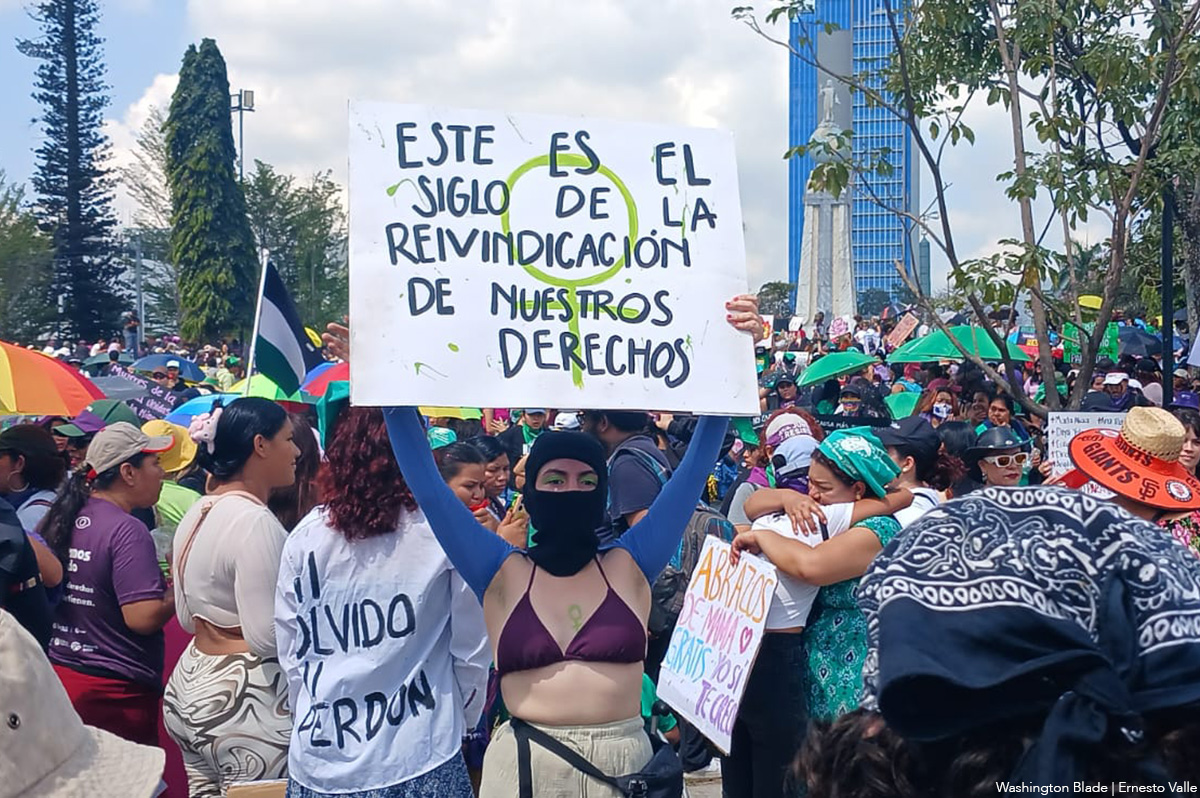
En El Salvador, la violencia contra la población LGBTQ+ no ha disminuido: ha mutado. Lo que antes se expresaba en crímenes de odio, hoy se manifiesta en discriminación institucional, abandono y silencio estatal. Mientras el discurso oficial evita cualquier referencia a inclusión o diversidad, las cifras muestran un panorama alarmante.
Según el Informe 2025 sobre las vulneraciones de los derechos humanos de las personas LGBTQ en El Salvador, elaborado por el Observatorio de Derechos Humanos LGBTIQ+ de ASPIDH, con el apoyo de Hivos y Arcus Foundation, desde el 1 de enero al 22 de septiembre de 2025 se registraron 301 denuncias de vulneraciones de derechos.
El departamento de San Salvador concentra 155 de esas denuncias, reflejando la magnitud del problema en la capital.
Violencia institucionalizada: el Estado como principal agresor
El informe revela que las formas más recurrentes de violencia son la discriminación (57 por ciento), seguida de intimidaciones y amenazas (13 por ciento), y agresiones físicas (10 por ciento). Pero el dato más inquietante está en quiénes ejercen esa violencia.
Los cuerpos uniformados, encargados de proteger a la población, son los principales perpetradores:
- 31.1 por ciento corresponde a la Policía Nacional Civil (PNC),
- 26.67 por ciento al Cuerpo de Agentes Municipales (CAM),
- 12.22 por ciento a militares desplegados en las calles bajo el régimen de excepción.
A ello se suma un 21.11 por ciento de agresiones cometidas por personal de salud pública, especialmente por enfermeras, lo que demuestra que la discriminación alcanza incluso los espacios que deberían garantizar la vida y la dignidad.
Loidi Guardado, representante de ASPIDH, comparte con el Los Angeles Blade un caso que retrata la cotidianidad de estas violencias:
“Una enfermera en la clínica VICITS de San Miguel, en la primera visita me reconoció que la persona era hijo de un promotor de salud y fue amable. Pero luego de realizarle un hisopado cambió su actitud a algo despectiva y discriminativa. Esto le sucedió a un hombre gay.”
Este tipo de episodios reflejan un deterioro en la atención pública, impulsado por una postura gubernamental que rechaza abiertamente cualquier enfoque de inclusión, y tacha la educación de género como una “ideología” a combatir.
El discurso del Ejecutivo, que se opone a toda iniciativa con perspectiva de diversidad, ha tenido consecuencias directas: el retroceso en derechos humanos, el cierre de espacios de denuncia, y una mayor vulnerabilidad para quienes pertenecen a comunidades diversas.
El miedo, la desconfianza y el exilio silencioso
El estudio también señala que el 53.49 por ciento de las víctimas son mujeres trans, seguidas por hombres gays (26.58 por ciento). Sin embargo, la mayoría de las agresiones no llega a conocimiento de las autoridades.
“En todos los ámbitos de la vida —salud, trabajo, esparcimiento— las personas LGBT nos vemos intimidadas, violentadas por parte de muchas personas. Sin embargo, las amenazas y el miedo a la revictimización nos lleva a que no denunciemos. De los casos registrados en el observatorio, el 95.35 por ciento no denunció ante las autoridades competentes”, explica Guardado.
La organización ASPIDH atribuye esta falta de denuncia a varios factores: miedo a represalias, desconfianza en las autoridades, falta de sensibilidad institucional, barreras económicas y sociales, estigma y discriminación.
Además, la ausencia de acompañamiento agrava la situación, producto del cierre de numerosas organizaciones defensoras por falta de fondos y por las nuevas normativas que las obligan a registrarse como “agentes extranjeros”.
Varias de estas organizaciones —antes vitales para el acompañamiento psicológico, legal y educativo— han migrado hacia Guatemala y Costa Rica ante la imposibilidad de operar en territorio salvadoreño.
Educación negada, derechos anulados
Mónica Linares, directora ejecutiva de ASPIDH, lamenta el deterioro de los programas educativos que antes ofrecían una oportunidad de superación para las personas trans:
“Hubo un programa del ACNUR que lamentablemente, con todo el cierre de fondos que hubo a partir de las declaraciones del presidente Trump y del presidente Bukele, pues muchas de estas instancias cerraron por el retiro de fondos del USAID.”
Ese programa —añade— beneficiaba a personas LGBTQ+ desde la educación primaria hasta el nivel universitario, abriendo puertas que hoy permanecen cerradas.
Actualmente, muchas personas trans apenas logran completar la primaria o el bachillerato, en un sistema educativo donde la discriminación y el acoso escolar siguen siendo frecuentes.
Organizaciones en resistencia
Las pocas organizaciones que aún operan en el país han optado por trabajar en silencio, procurando no llamar la atención del gobierno. “Buscan pasar desapercibidas”, señala Linares, “para evitar conflictos con autoridades que las ven como si no fueran sujetas de derechos”.
Desde el Centro de Intercambio y Solidaridad (CIS), su cofundadora Leslie Schuld coincide. “Hay muchas organizaciones de derechos humanos y periodistas que están en el exilio. Felicito a las organizaciones que mantienen la lucha, la concientización. Porque hay que ver estrategias, porque se está siendo silenciado, nadie puede hablar; hay capturas injustas, no hay derechos.”
Schuld agrega que el CIS continuará apoyando con un programa de becas para personas trans, con el fin de fomentar su educación y autonomía económica. Sin embargo, admite que las oportunidades laborales en el país son escasas, y la exclusión estructural continúa.
Matar sin balas: la anulación de la existencia
“En efecto, no hay datos registrados de asesinatos a mujeres trans o personas LGBTIQ+ en general, pero ahora, con la vulneración de derechos que existe en El Salvador, se está matando a esta población con la anulación de esta.”, reflexiona Linares.
Esa “anulación” a la que se refiere Linares resume el panorama actual: una violencia que no siempre deja cuerpos, pero sí vacíos. La negación institucional, la falta de políticas públicas, y la exclusión social convierten la vida cotidiana en un acto de resistencia para miles de salvadoreños LGBTQ+.
En un país donde el Ejecutivo ha transformado la narrativa de derechos en una supuesta “ideología”, la diversidad se ha convertido en una amenaza política, y los cuerpos diversos, en un campo de batalla. Mientras el gobierno exalta la “seguridad” como su mayor logro, la población LGBTQ+ vive una inseguridad constante, no solo física, sino también emocional y social.
El Salvador, dicen los activistas, no necesita más silencio. Necesita reconocer que la verdadera paz no se impone con fuerza de uniformados, sino con justicia, respeto y dignidad.
Ukraine
Meet the gay couple fighting for marriage rights in Ukraine
Activists claim U.S. Christian groups are financing attacks on equality
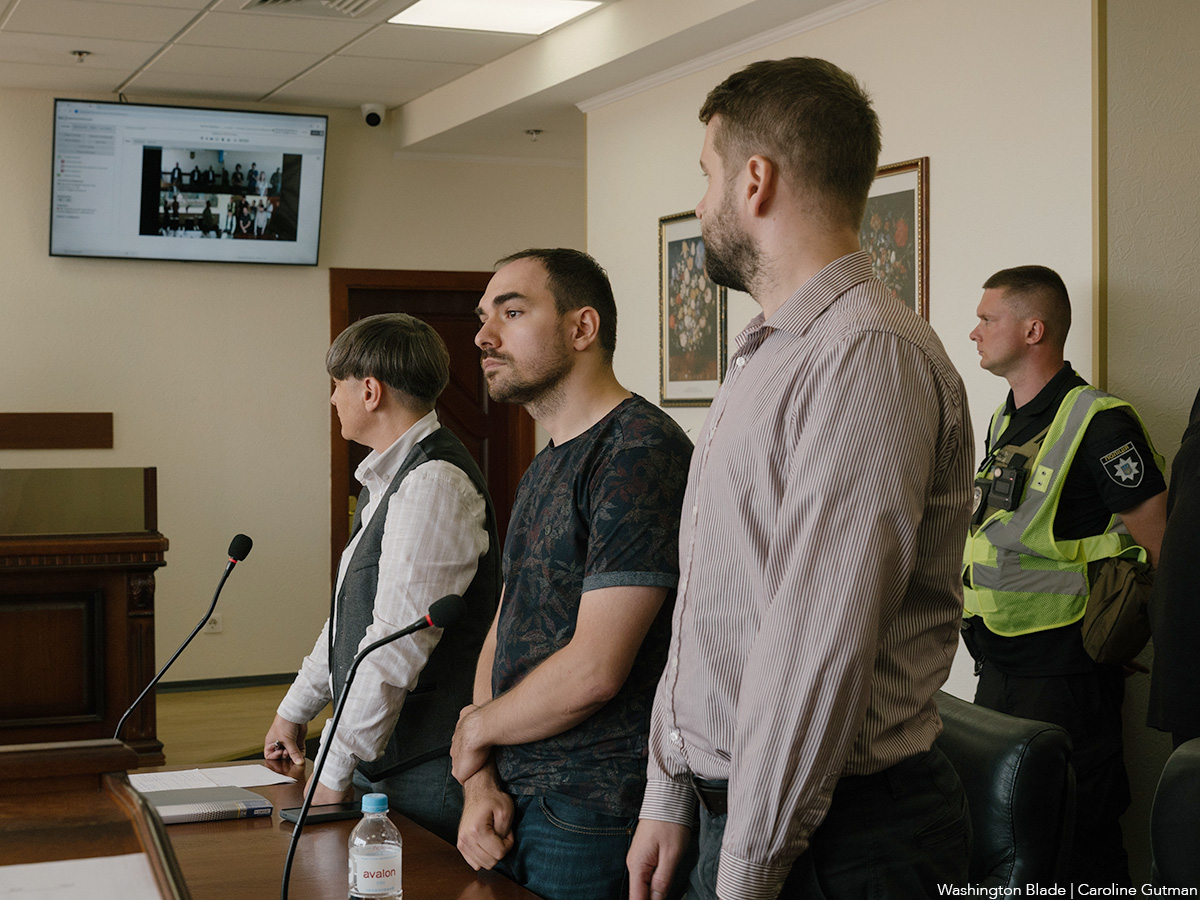
(Editor’s note: The International Women’s Media Foundation’s Women on the Ground: Reporting from Ukraine’s Unseen Frontlines Initiative in partnership with the Howard G. Buffett Foundation funded this reporting.)
Thirty-one-year-old Timur Levchuk was hurrying downstairs, away from the stuffy courtroom, packed with reporters, members of far-right groups and LGBTQ activists. The court hearing sounded like a duel between ideologies. The word “family” was the target — his family. Levchuk’s opponents from the conservative group Vsi Razom or All Together, initiated the court hearing to dissolve his marriage. He was trying to hold back his emotions.
The war has been breathing death, ruining lives across his country for nearly four years. At any moment, a missile or drone could hit his home. Under martial law, the border was closed for men of Levchuk’s age. He had not been able to move together with his partner, a Ukrainian diplomat, Zoryan Kis, who is posted on a mission abroad. Almost every night, he awakes to air alerts, to Russia’s attacks. And now aggressive right-wing activists were attacking his marriage, his right to be happy, to have a future.
As soon as Levchuk stepped outside, he saw a crowd of his friends from the LGBTQ community cheering and jumping with joy, holding colorful banners in their hands: “Our family is real!” and “Family is above the stereotypes!” Overwhelmed with emotions, Levchuk broke into tears. His partner of 13 years, Kis, quickly walked up to him. They hugged, as their friends cheered the first legal gay marriage victory in Ukraine.
Levchuk’s face was wet, he was crying. The partners see one another just twice a year; but this fight for their official marriage went on and on, it meant a chance to live together.
“Zorian had to travel from Israel for this hearing today, for just one day, and half of our day was stolen from us by this conservative group, which acts just like Russian homophobes,” Kis told the Blade.
Tears continued to run down his face.
“We hear that our opponents from Vsi Razom, the group fighting the court decision recognizing our marriage, is supported by the U.S. fundamental Christian groups. This is shocking. We are attacked on the money from what used to be the world’s best democracy,” Levchuk told the Blade.
A group of right-wing supporters waited by the entrance to the court, too, with a few policemen in between, watching out for any signs of violence, in a country with enough of it already.
“This decision, this process of legalizing my marriage took me so much time, so much effort,” Levchuk continued. “I knew it would be painful. Our opponents, Vsi Razom activists and their leader, Ruslan Kukharchuk, claim they feel offended by the court decision. But it is our feelings and our rights that are being hurt.”
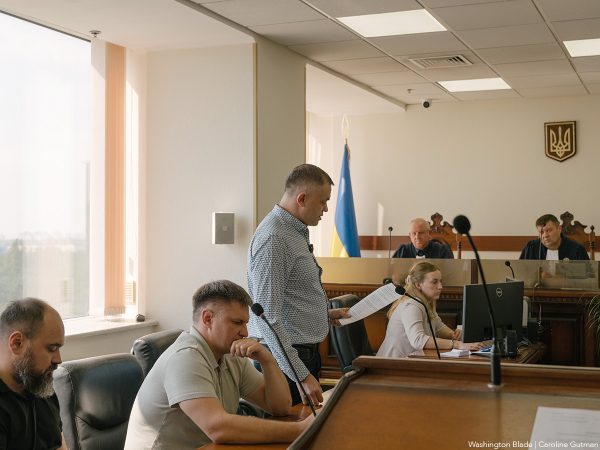
The appealing side, a middle-aged man, Kukharchuk, has been fighting against LGBTQ for more than 20 years. On Sept. 21, 2003, Kukharchuk and his group, called Love is Against Homosexuals, protested on Kyiv’s central square of Maidan with banners that said “Homosexualism is the enemy of family!” “Single sex love does not exist!”, and “You cannot be born gay, you can become gay.” Kukharchuk has been leading dozens of protests against LGBTQ rights. The Ukrainian Parliament voted for a new law criminalizing any reference to homosexuality in the media or public domain in 2012.
Before the Revolution of Dignity in 2014, the absolute majority of Ukrainians, up to 95 percent, did not support the idea of same-sex marriages, according to a social study conducted by GfK Ukraine, a social and market research group. But the revolution, the war in the east and the Russian invasion of Ukraine has dramatically changed the public view on the rights of minorities. Last year, more than 70 percent of Ukrainians said that LGBTQ people should have the same rights as everybody else, according to a survey by the International Institute of Sociology in Kyiv.
But Kukharchuk has not given up.
A fluent English speaker, he talks as if addressing President Donald Trump, encouraging America, too, to rise against LGBTQ rights.
“The U.S. government should not repeat the same mistake: not having the right actions behind the right beliefs,” he says on the Evangelical Focus, an outlet that describes its mission as “helping build bridges between evangelical churches and all of society.” He continues to trumpet his cause: “Ukraine unlike many European countries is the country where LGBT flags are still not flown on government buildings, where people are not fined for praying.”
Levchuk and Kis are not against Christian believers. They believe in Ukraine’s tolerance and respect for the rights of minorities. It’s been a thorny and long path for the two longtime LGBTQ activists. To test their hometown of Kyiv for homophobia, the two in 2015 on a summer day strolled around the city center, holding each other’s hands. Their friends were filming public reaction to the gay couple’s open walk. It seemed peaceful, at first. Pedestrians stared but did not insult the couple until the two sat down on a bench on the central street of Khreshchatyk. Three men attacked them, kicking Levchuk and Kiss, and spraying them with tear gas. The video of the violent attack went viral.
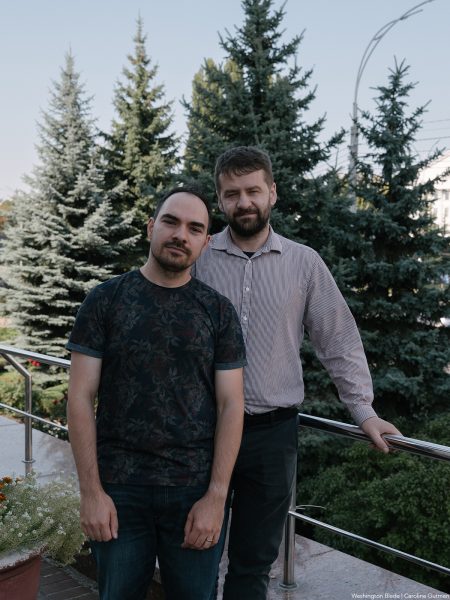
Levchuk and Kis waited for Ukraine to grow more tolerant for years. Kyiv rejected their marriage in 2021, “due to the fact that according to the legislation of Ukraine, the concept of marriage is defined as a family union of a woman and a man.” Last year, Kis was appointed to work in the Ukrainian embassy in Israel; and since all diplomatic families had a right to live together on diplomatic missions, he began to fight in court for his spouse’s right to travel abroad. Men are prohibited from traveling abroad under martial law rules intended to prevent draft dodging. Last year, Kyiv’s court decided to “refuse the proceedings.” But on July 10 this year, Kyiv’s district court recognized the fact of a “one-sex couple of spouses,” giving the couple a legal right to a marriage. That was a first in Ukraine’s history.
That decision was “unacceptable” to Kukharchuk and the Vsi Razom group; they appealed the court decision. When asked what brought him to the Kyiv Court of Appeal on Sept. 10, Kukharchuk said: “We absolutely believe that the Constitution is on our side. It very firmly underlines and emphasizes the definition of marriage — it can only be a union between one man and one woman, so our position in court is very clear.”
To the great joy of all Ukrainian LGBTQ couples, Kyiv’s appeal court confirmed the fact of the two men living in “a family” on Sept. 10. It recognized their marriage. But the victory felt bittersweet. The powers behind their opponents were in the United States, the spouses told the Blade.
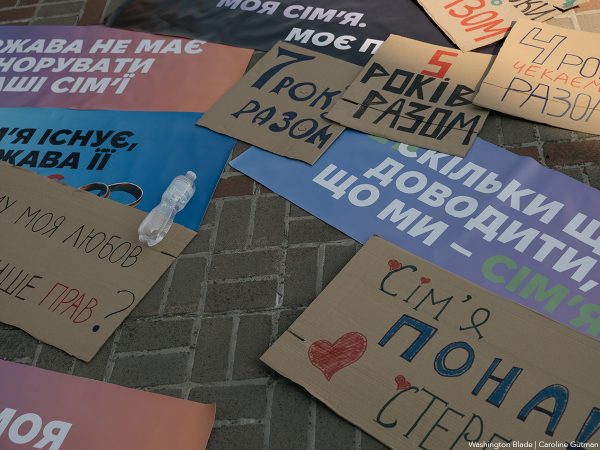
“We hear that our opponents from the conservative Vsi Razom group, receive financing from the Christian groups in the U.S.,” Levchuk told the Blade. “It’s hard to comprehend that our right to be happy is being questioned in the country of the best democracy in the world, the United States.”
But Kukharchuk lost the case, at least this time.
“We realize that our fight is not over. It’s hard and it takes forever. Our opponents will surely take the decision to the Supreme Court now,” Kis told the Blade.
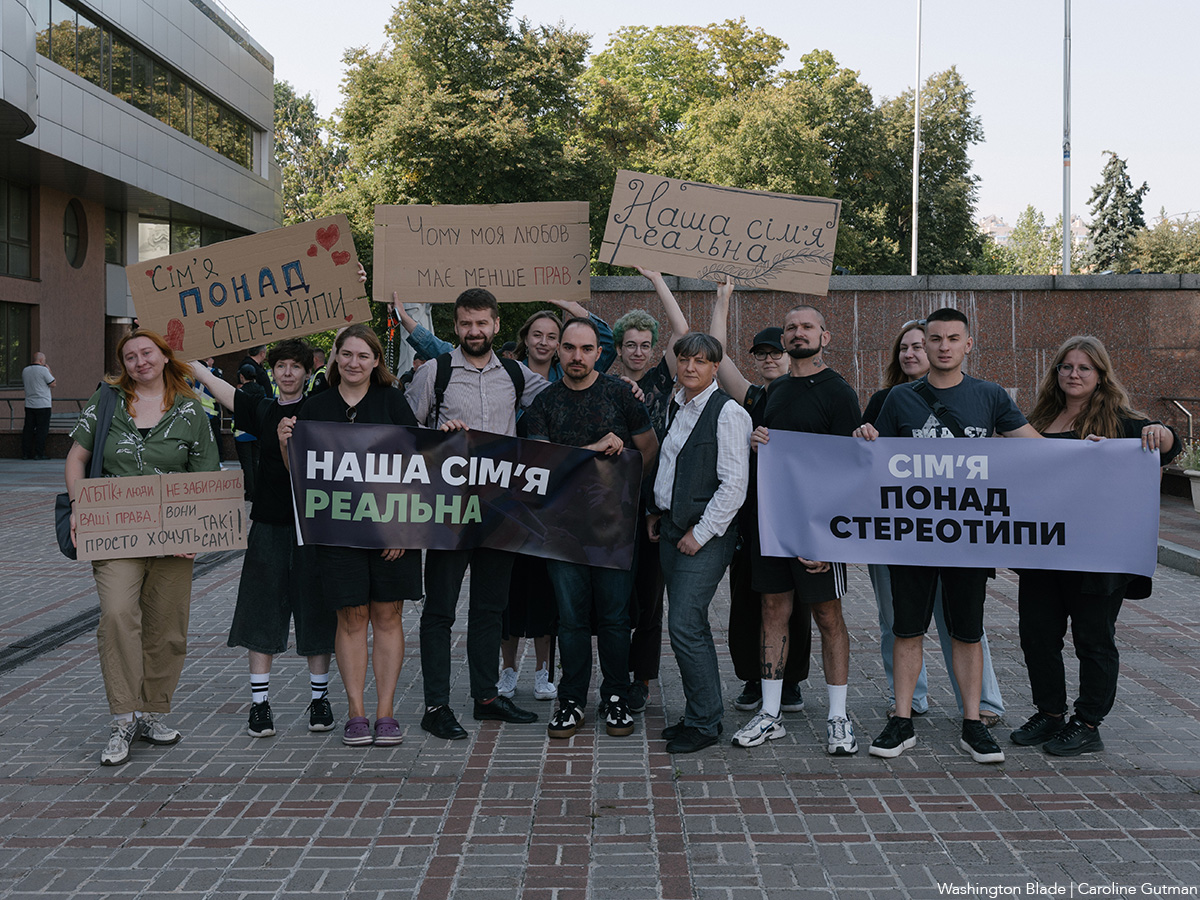
Ukraine
On the ground with Ukraine’s LGBTQ war heroes
Building a community amid attacks from inside and outside the country

(Editor’s note: The International Women’s Media Foundation’s Women on the Ground: Reporting from Ukraine’s Unseen Frontlines Initiative in partnership with the Howard G. Buffett Foundation funded this reporting. This report is exclusive to the Blade.)
Ukraine’s LGBTQ war heroes have a chance to build a community and share their courage.
Despite Russian drones raining down on the capital, Kyiv’s gay military and veteran community gathers in a freshly redecorated safe space called “K-41.” The club has been a boiling pot this summer — Ukrainian, German, Dutch, and Portuguese DJs played music on warm September nights, guests gathered to dance, listen to lectures, or see a movie in the leafy garden outside.
One of the recent lectures was on “Practices for Non-Discrimination for LGBTQ people in the Workplace.” For many community members, the workplace is now the front, where they continue to fight and defend their country from Russian troops attacking Ukraine’s eastern, northern, and southern regions. And on rejoining the community for a break, veterans take up a different fight, for their human rights, against discrimination. Their fight does not stop on the front lines.
The number of LGBTQ heroes is growing; so is the number of fallen, sadly. There is a wall at the center covered in soldiers’ patches.
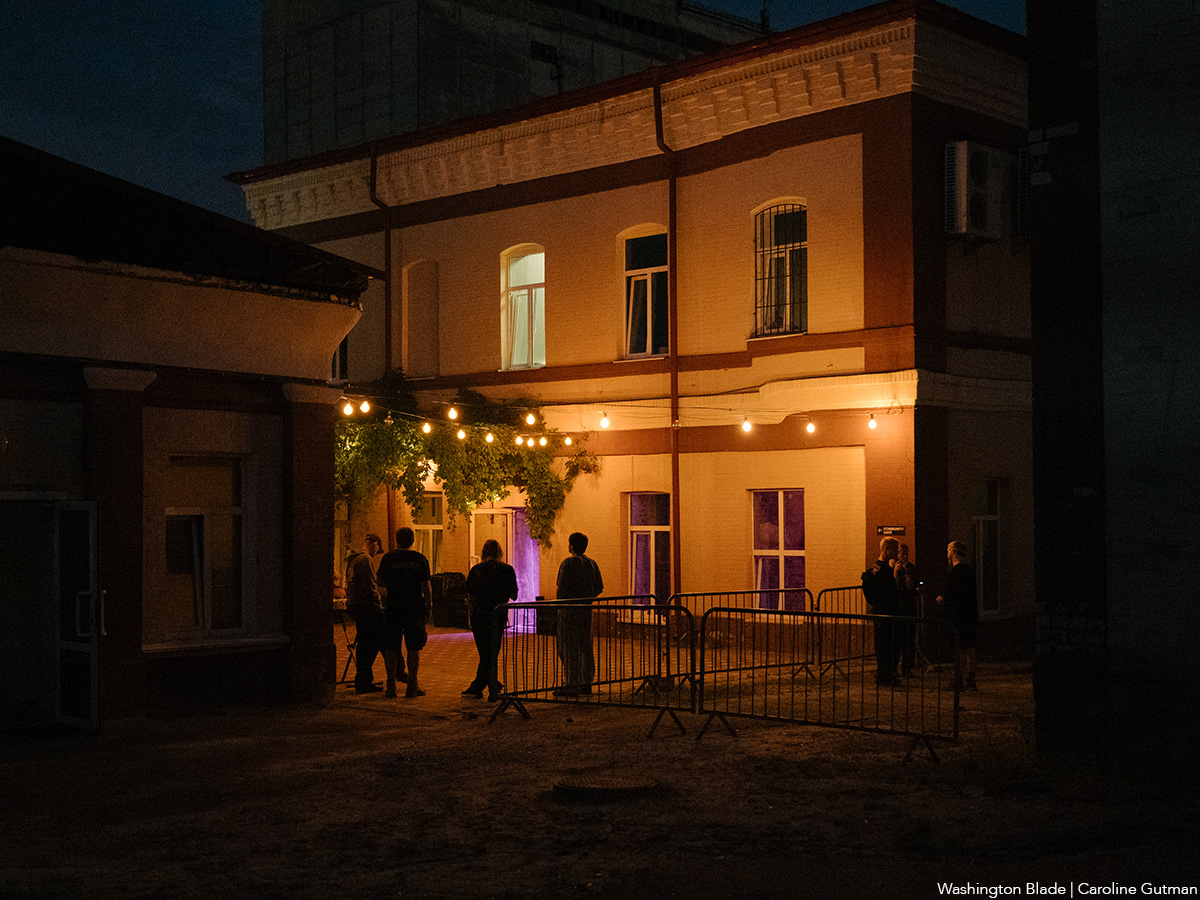
“Soldiers and veterans pop in and stick their insignias to this wall — we have welcomed more than 700 members into our LGBTQ veteran and military club,” one of the center’s founders, 38-year-old veteran, Victor Pylypenko, told the Blade with pride. Openly gay, he volunteered and fought for his country from 2014-2016 and then again from 2022-2024.
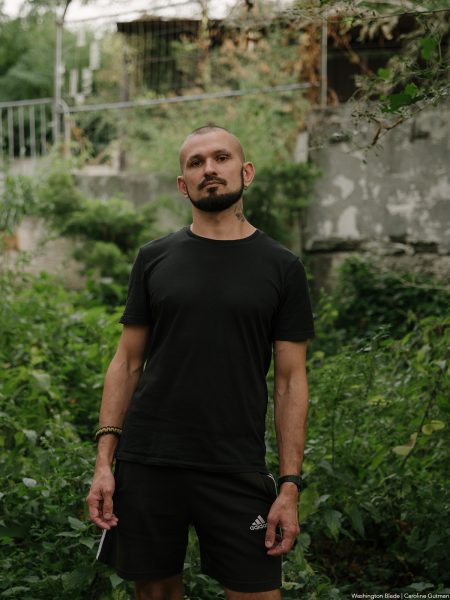
Giving us a tour of the club on a recent night, Pylypenko pointed out a portrait on the wall of another war hero, the newly elected leader of the “Ukrainian LGBT Military Personnel and Veterans for Equal Rights” NGO, Oleksandr Demenko. He is a survivor of the hellish battle for Mariupol and 20 months of horrific imprisonment in Russia.
“I always eat all the edges of the pizza, because I know that my brothers in arms do not have enough food or enough water in jail right now,” Demenko wrote, sharing his emotions recently with his Facebook readers.
A decorated officer, Demenko was among about 2,500 Ukrainian soldiers defending Azov Steel, a giant Soviet-era steel plant that was surrounded during the battle for the city of Mariupol from February to May, 2022.
Thanks to the British photographer Jesse Glazzard, who followed the lives of Ukrainian gay soldiers, Elton John helped Ukraine’s queer heroes.
“Elton John and his partner, David Furnish, bought a photograph by Glazzard in May and gave funds for our reconstruction of this center,” Pylypenko told the Blade. “We fixed the two rooms of the space nicely, bought furniture and the movie screen for our LGBTQ veterans — the biggest community for a military in Eastern Europe.”
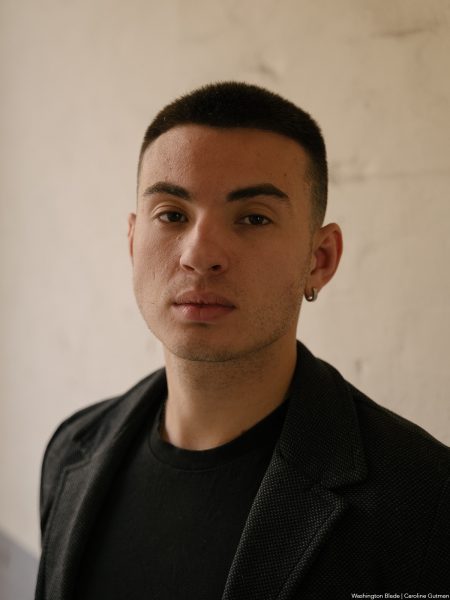
Demenko and his boyfriend recently became engaged, and the fight for the legalization of gay marriage became personal. Both Pylypenko and Demenko came to Kyiv’s Court of Appeals last month to support the first legal marriage.
“Every gay couple in our country hopes for President Zelensky to allow us to marry. This is our human right, along with every citizen,” the decorated veteran Demenko said in a recent interview.
To most members of this community, the war started in 2014 with Russia annexing the Crimean Peninsula. As many self-defense volunteers, Pylypenko, joined to defend his country in the Eastern regions of Ukraine. He served for nearly two years. There was too much homophobia at the time, so he stayed in the closet during his service. On coming home to Kyiv, Pylypenko tried to reconstruct his peaceful life, went to university and finished a master’s program in technical and scientific translation from English and French.
But the conflict with Russia did not stop; it escalated to Russia’s full-scale invasion early on the morning of Feb. 24, 2022. Pylypenko was visiting his parents in the town of Borodianka, a suburb north of Kyiv. Russian shelling blew up and burned buildings in Borodianka, killing hundreds of civilians.
Without thinking twice, Pylypenko volunteered to defend his country again, this time openly gay.
“At some point, I took out my cell phone with rainbow stickers from K-41 club; and my sergeant asked me if I was gay in front of everybody. I answered yes. The commander, who was only 22 years old, did not have any problems with that,” Pylypenko said.
During the battle for Kyiv, his platoon was defending the capital from the trenches on freezing cold days and nights, and saved lives of their wounded brothers in arms by evacuating them to hospitals. Pylypenko’s military experience was useful. And after Kyiv, he fought in the Sumy and Kharkiv regions. Some campaigns turned out “disastrous,” he said.
Last year, Pylypenko had to resign to take care of his father, who was “like a baby after a stroke.” The law allowed that. Shortly after his return from the front, the Ukrainian Orthodox Church honored him for “Courage and Love for Ukraine.”
“I thanked the church and Patriarch Filaret, previously famous for stating that gays had created COVID-19. I expressed my hopes that the priest would reject his homophobia; but immediately, the same day he cancelled his medal to me,” Pylypenko said. “Immediately, a flash mob began, soldiers who had previously received that same medal denounced it in solidarity with me. The soldiers’ brotherhood is great.”
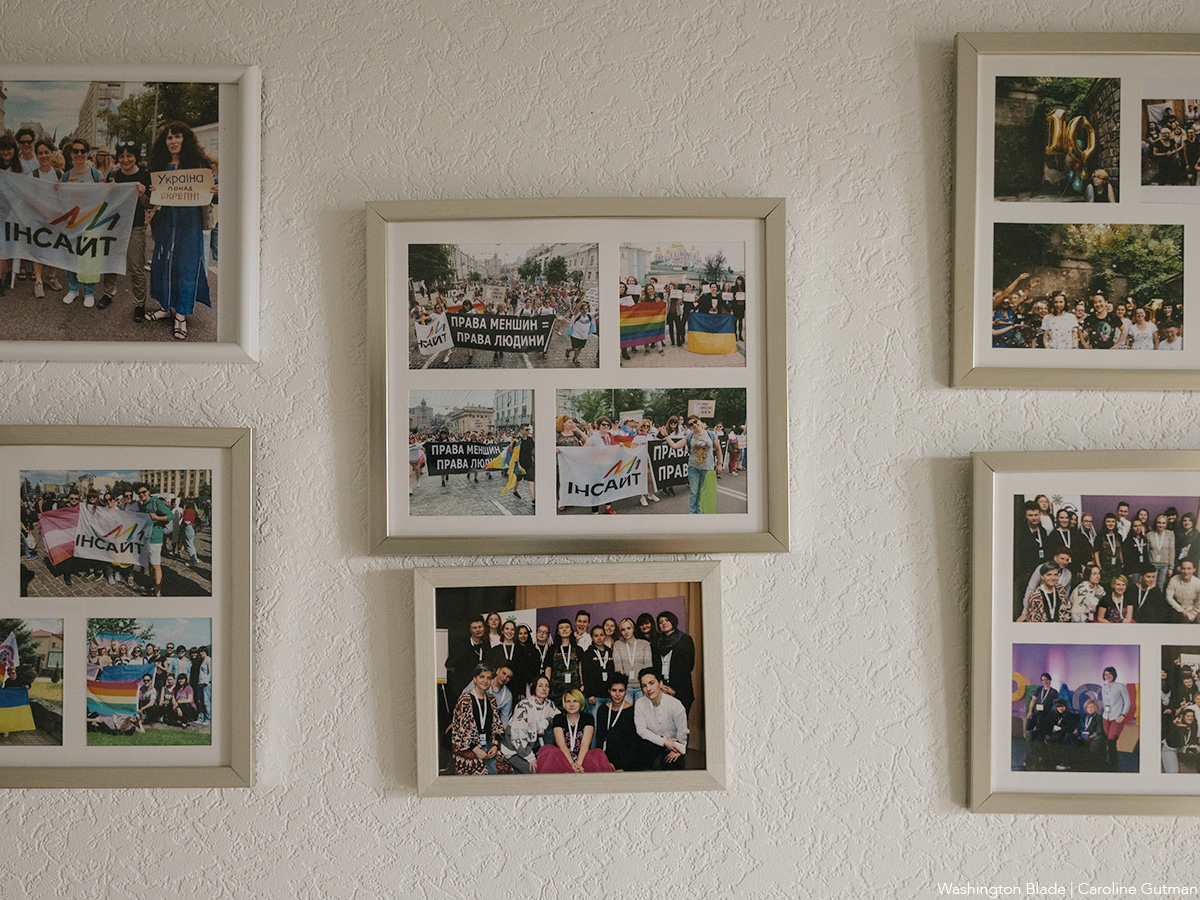
The battle for survival during the war is tiring. The battle for human rights in the war-torn country is exhausting. The LGBTQ community is vibrant, active and well-organized in Ukraine. Its activists across the country fight for human rights, judicial reform and against corruption together with prominent civil liberties groups. Olena Shevchenko, 42-year-old leader of Insight, a group focusing on LGBTQ and feminist activism, says there is no time to live: “I have no life. I have a constant fight.”
The Insight community center is a cozy house in the hipster part of Kyiv’s old town, Podil. For nearly four years, Insight activists have been providing aid, legal support and shelter for their community, organizing art exhibits and taking part in anti-corruption and pro-democracy campaigns.
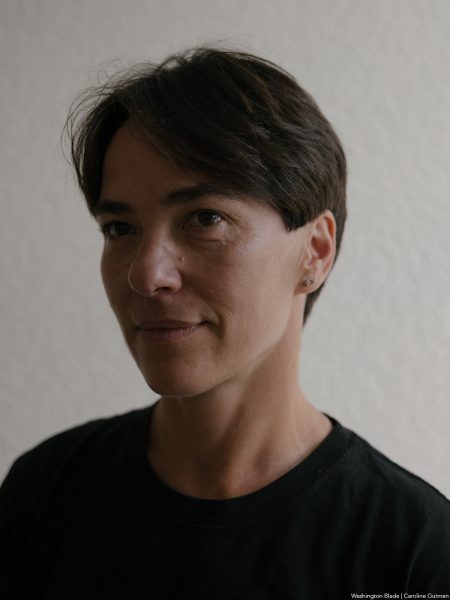
“Three days ago, homophobes attacked our center in Lviv and before that our center in Ivano-Frankivsk; some thugs stormed our exhibition in the city of Chernovtsy,” Shevchenko told the Blade. “They come again and again, break windows, spray walls with paint that imitates blood. Their goal is to block our events. They spray tear gas, terrify our activists.”
Shevchenko said that the attacks on the LGBTQ centers around the country are organized by far-right groups.
“One group is called Carpathian Sich, another Brotherhood, led by Dmytro Korchinsky and various new groups and networks frequently launched, like Tradition and Order,” she said. “We noticed that they received some amount of money about a year ago. They put around homophobic posters and aggressive stickers — we can tell that the money is coming to them. If before, money came from Russia, now they get funded from the U.S. as well.”
In spite of the attacks and risks, the community lives. Shevchenko, as many Ukrainians in the rear, saw her fight for human rights and against corruption as just as important as the fight on the frontline.
“If we don’t fight for democracy, who will do it? Our country would look bad if we stop. This is not just about LGBTQ, this is about freedom, democracy and the spirit that you can fight for something that is right,” she said. “Our government should be reminded about how good we are still at self-organization. We’ll be always here, this our own front. We have to keep track of democracy on all levels.”

Celebrity News
Lesbian comedian who performed in Saudi Arabia apologizes
Jessica Kirson invited to participate in Riyadh Comedy Festival

A lesbian comedian who performed at a comedy festival in Saudi Arabia has apologized.
Jessica Kirson joined Dave Chappelle, Pete Davidson, and dozens of other comedians who participated in the Riyadh Comedy Festival that began in the Saudi capital on Sept. 26 and is scheduled to end on Thursday.
Kirson performed on Sept. 29.
Saudi Arabia is among the countries in which consensual same-sex sexual relations remain punishable by death.
A U.S. intelligence report concluded Saudi Crown Prince Mohammed bin Salman “likely approved” the murder of Jamal Khashoggi, a Washington Post columnist, inside the Saudi Consulate in Istanbul in 2018. The Saudi government has also faced criticism over the treatment of women, migrant workers, and other groups in the country.
“On Sept. 29, I performed at the Riyadh Comedy Festival. This decision has weighed heavily on my heart ever since,” said Kirson in an exclusive statement to The Hollywood Reporter. “I like to express my sincere regret for having performed under a government that continues to violate fundamental human rights.”
She said she was “surprised” as “an openly gay person” to receive an invitation to perform at the comedy festival.
“I requested a guarantee that I could be openly out as a lesbian on stage and perform gay material. I hoped that this could help LGBTQ+ people in Saudi Arabia feel seen and valued,” said Kirson. “I am grateful that I was able to do precisely that — to my knowledge, I am the first openly gay comic to talk about it on stage in Saudi Arabia. I received messages from attendees sharing how much it meant to them to participate in a gay-affirming event. At the same time, I deeply regret participating under the auspices of the Saudi government.”
Kirson in her statement to THR said she “donated the entirety of what I was paid to perform there to a human rights organization.”
She did not say how much the comedy festivals paid her, or the group to which she donated her fee.
“I made this decision because I want that money to go to an organization that can help combat these severe issues,” said Kirson.
THR notes Marc Maron, David Cross, and Atsuko Okatsuka are among the comedians who criticized the festival. Kirson in her statement said she respects her “fellow comics who have spoken out against” it.
“I recognize the concerns and criticism this has raised. I hope that this moment sparks dialogue about how we can use our platforms for good — to support people without a voice and to find ways to be less divided,” she said. “In the past, I’ve faced criticism for choices I’ve made, both on and off stage, and I rarely responded. This time, I felt I needed to speak up. I could not remain silent.”
Kirson ended her statement with an apology to her fans and others she has “hurt or disappointed.”
“I have a special relationship with my fans because of the vulnerable nature of my comedy and the trust they place in me as part of the queer community,” she said. “To my fans: I see you. I hear you. Your voice matters to me. I love you all, and I am genuinely sorry for making a poor decision that had repercussions I didn’t fully consider. I will take full responsibility for my actions and dedicate myself to making amends, so that my words and choices reflect the respect and care you deserve.”
The 2034 World Cup will take place in Saudi Arabia.
Qatar, which borders Saudi Arabia, hosted the 2022 World Cup. Consensual same-sex sexual relations remain punishable by death in the Middle East country.
President Donald Trump in May visited Qatar, Saudi Arabia, and the United Arab Emirates.
Colombia
Luto en Antioquia y Colombia: asesinan a la activista trans y politóloga Victoria Strauss
Su ausencia deja un vacío enorme

La comunidad LGBTQ+ en Colombia está de luto tras conocerse el fallecimiento de Victoria Strauss, reconocida politóloga egresada de la Universidad de Antioquia, activista trans y defensora de los derechos humanos, quien además se desempeñaba como docente universitaria.
Victoria fue hallada sin vida este lunes en Santa Elena, Antioquia, después de haber sido reportada como desaparecida el 29 de septiembre. La noticia ha generado una profunda conmoción entre sus colegas, amistades y los movimientos sociales que la conocieron por su compromiso incansable en la defensa de la diversidad y la igualdad.
Un legado que no morirá
El trabajo de Strauss se consolidó como un pilar del activismo trans en Antioquia, inspirando a nuevas generaciones de liderazgos y abriendo caminos en la academia y en los espacios de participación social y política. Su ausencia deja un vacío enorme, pero también un legado que seguirá marcando la lucha por los derechos de la población LGBTQ+.
Desde OrgulloLGBT.co expresamos nuestra solidaridad con su familia, amistades y con todos los sectores de la sociedad que hoy sienten su partida. Exigimos a las autoridades que se investiguen de manera urgente las circunstancias de su muerte y que se esclarezca si existieron negligencias en la atención y búsqueda.
Hoy despedimos a una gran lideresa trans, cuya voz no se apagará y cuyo legado seguirá vivo en cada lucha por la igualdad.
Mongolia
UN urges Mongolia to do more to protect LGBTQ+ rights
Discrimination, lack of legal recognition undermine progress
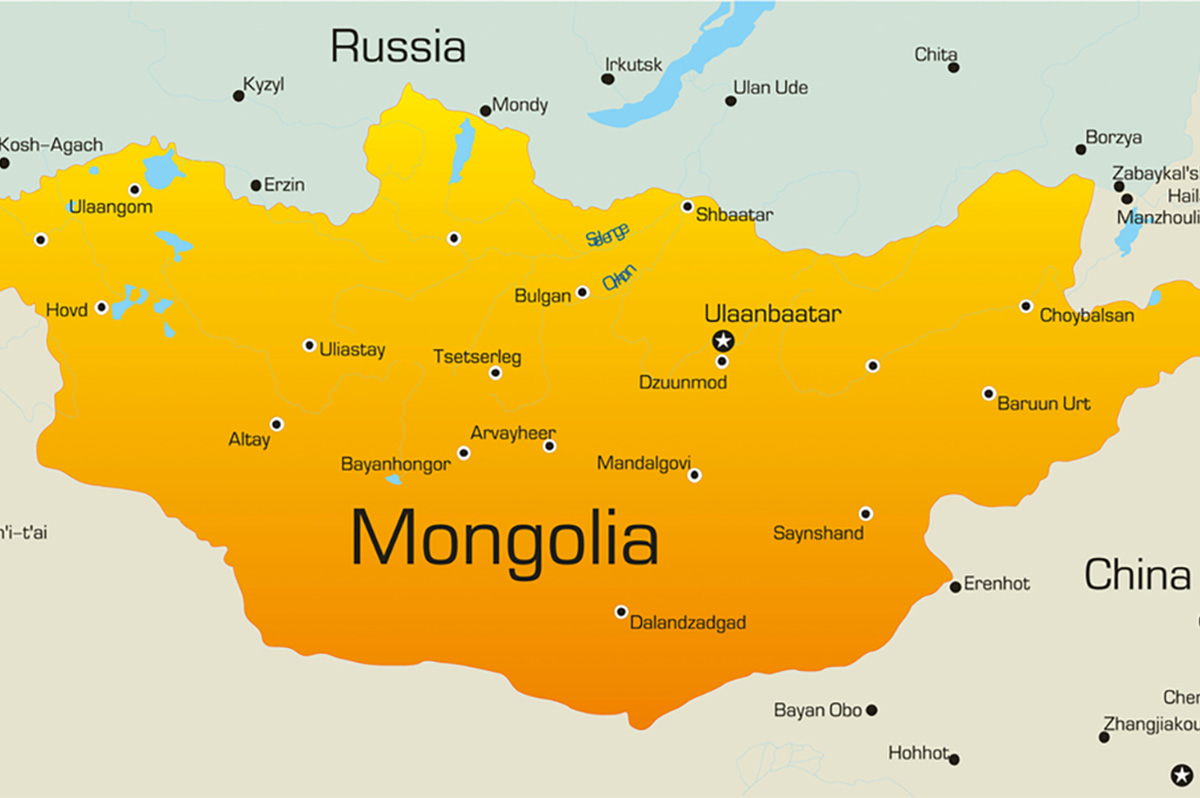
The U.N. earlier this year urged Mongolia to bolster protections for LGBTQ+ and intersex people, warning that entrenched discrimination and gaps in legal recognition continue to undermine recent progress.
In its Concluding Observations on the Fifth Periodic Report of Mongolia, the U.N. Human Rights Committee cited unreported attacks, bias in law enforcement, and the absence of rights for same-sex couples as barriers to equality in the country.
Mongolia has made measurable strides toward LGBTQ+ inclusion: decriminalizing consensual same-sex sexual relations, and outlawing discrimination based on sexual orientation and gender identity in its labor and criminal codes. Hate crime provisions allow for tougher penalties, and transgender people can amend legal documents to reflect their gender, though only after medical intervention. Mongolian law, however, stops short of recognizing same-sex marriages or civil unions, offers no status for nonbinary people, and provides limited protection for queer parents, leaving much of the community without full legal equality.
The Human Rights Committee also faulted Mongolia for the weak enforcement of its broader anti-discrimination framework, noting that few complaints reach the courts and prosecutions remain rare — a gap that limits remedies for LGBTQ+ people, despite legal protections on paper. The committee urged the government to widen the definition of discrimination, ease the burden of proof for victims, and raise public awareness about how to seek redress, alongside strengthening the reach and diversity of its National Human Rights Commission.
The U.N. Human Rights Committee has urged Mongolia to adopt sweeping anti-discrimination laws that protect people from bias in both public and private life, specifically including sexual orientation and gender identity. It also called for strong legal remedies and recommended that judges, prosecutors, and law enforcement officials receive proper training on discrimination, alongside broader efforts to raise public awareness about how victims can seek justice.
The report also called on Mongolia to intensify efforts to combat stereotypes and prejudice against LGBTQ+ and intersex people. It urged authorities to ensure that acts of discrimination and violence targeting them are thoroughly investigated, that perpetrators are prosecuted and, if convicted, receive appropriate penalties, and that victims are granted full reparations.
The committee further recommended guaranteeing freedom of peaceful assembly for LGBTQ+ and intersex people, including during the annual Equality Walk at Chinggis Square in Ulaanbaatar, the Mongolian capital, ensuring that any restrictions are applied fairly and in line with international standards. The report also highlighted the need for legislation that recognizes and protects same-sex couples.
The U.N. report also raised alarms over restrictions on peaceful assembly in Mongolia, citing accounts that authorities have curtailed demonstrations critical of the government as well as gatherings in support of LGBTQ+ and intersex rights. While acknowledging a draft revision of the 1994 law on demonstrations and assembly that would shift to a notification system, the committee warned a proposed requirement for police authorization to use main roads could undermine those reforms. It further expressed concern about reports of disproportionate force and arbitrary detentions during protests, and about a pending bill to amend the Criminal Code to impose prison sentences on those obstructing mining or other development projects, which could erode protections for the right to peaceful assembly.
Authorities on Dec. 4, 2024, arrested Naran Unurtsetseg, editor-in-chief of Zarig.mn, an independent news site, and held her for 68 days on charges that included contempt of court and spreading false information after she criticized judges and a prosecutor online. The arrest took place weeks after the General Judiciary Council urged an investigation into her remarks, and the site was briefly blocked ahead of her detention. The case has drawn sharp criticism from press freedom groups over the misuse of criminal defamation laws to stifle critical journalism in Mongolia.
Erdeneburen Dorjpurev, deputy director of the LGBT Center in Mongolia, told the Los Angeles Blade that in recent years her organization has handled several cases in which police officers themselves perpetrated prejudice, discrimination, abuse and harassment against LGBTQ+ people.
“These cases often make up around 30 percent of our referrals,” Dorjpurev noted.
She cited a 2022 incident in which officers allegedly forced their way into a gay couple’s home without a warrant, physically assaulted and verbally abused them, and mocked their sexual orientation. Dorjpurev said the officers also demanded access to the couple’s personal devices and, after obtaining it, circulated intimate videos among themselves and to others, deliberately humiliating the pair because of their identity.
“The survivor of this incident refrained from reporting this incident due to a fear of further harassment and abuse from the police,” Dorjpurev told the Blade. “The police officers in this incident, deliberately treated the couple with hostility, using derogatory terms in referring to their sexual and gender orientation. The police abused the position and power to humiliate the survivors by treating them inhumanely due to their own prejudice and discrimination against the LGBTQI+ community.”
Dorjpurev said the U.N. Human Rights Committee report underscored persistent mistreatment of LGBTQ+ people in Mongolia by police and healthcare providers. She noted incidents of discrimination and inhumane treatment “are still not being taken seriously and are often refused as official complaints,” leaving victims with little recourse. Dorjpurev added her organization urged authorities to expand scrutiny of human rights conditions for LGBTQ+ people in detention facilities, prisons, military bases, and other closed institutions, stressing the need to ensure those spaces are safe for sexual and gender minorities.
“While the Criminal Code includes provisions that sanction discrimination based on sexual orientation and gender identity, we still lack the proper tools to protect and support individuals. Even today, we still struggle in safe reporting, file complaints against any discriminatory acts,” Dorjpurev told the Blade. “This is due to the fact that individuals are still refused service from state services, still treated unfairly as well as still face harassment and discrimination from service providers. There is still a culture where an individual’s private information is disclosed without their consent, especially around their sexual orientation and gender identity. Further, service providers additionally utilize derogatory terms to shame and embarrass individuals, as well as repeatedly ask unnecessary, provoking questions around their gender and sexual orientation and identity.”
Dorjpurev further noted that, given this climate, most LGBTQ+ people in Mongolia are reluctant to seek help from state agencies or even private service providers, fearing further mistreatment or denial of their basic rights. Legal assistance is also scarce, she said, as few lawyers or other professionals focus on human rights and anti-discrimination cases.
Dorjpurev recalled a lawyer who collaborated with the LGBT Center on a case in 2019 faced harassment and discrimination simply for representing an LGBTQ+ client.
Dorjpurev highlighted that, to date, there has not been a single successfully resolved case of discrimination under Article 14.1 of the Criminal Code.
The LGBT Center in 2019 filed a complaint against a high-ranking state official who abused his authority to remove the organization’s posters from buses during Equality and Pride Days and posted anti-LGBTQ+ content on social media. Dorjpurev noted prosecutors at multiple levels rejected the case, despite many complaints.
“In Mongolia, despite not following ‘Western’ conversion therapy, we have our traditional Shamanic religion as well as Buddhism which still heavily influences our society,” she said.
“We have been referred to cases where community members have been subject to religious conversion — this mostly impacts those under the age of 18 where their parent or guardian believes they are suffering from a mental illness or other forms of health issue therefore forces them into meeting religious figures and shamans.” added Dorjpurev. “This is because the parent or the guardian often believe that they would be able to ‘pray away’ or ‘wash away’ their queer identity. These kinds of practices are often repeated on a daily basis having a severe impact on the mental wellbeing of their children; in some incidents these children are forced into having sexual intercourse with the opposite sex in order to ‘make them straight.’”
The LGBT Center in 2021 worked on the case of an gay 18-year-old who was told he would be burned with a hot stone and whipped if he did not become straight and gender conforming. Dorjpurev noted this man “was also referred to be sent to a psychiatrist where he was administered various different psyche-altering medications.”
Dorjpurev emphasized a key step for the Mongolian government is to demonstrate genuine commitment to LGBTQ+ and intersex rights and to transparently engage with civil society organizations. She noted that while various policies and laws have been introduced in the name of protecting LGBTQ+ and intersex people, these measures have largely excluded direct input from human rights defenders, limiting their effectiveness and accountability. Dorjpurev added these policies would have a stronger impact if developed in genuine consultation with civil society, ensuring concrete human rights provisions.
The LGBT Center, the National Human Rights Commission, and the Ulaanbaatar mayor’s office in 2024 co-organized a roundtable to discuss LGBTQ+ and intersex rights. Dorjpurev said this collaboration made the 2024 and 2025 Equality Marches possible.
She told the Blade that such examples demonstrate the benefits of consistent engagement with NGOs to build meaningful civic space and translate Mongolia’s commitment to equality into practice.
Dorjpurev called on international organizations, particularly the U.N., to continue supporting activists through in-person advocacy, technical assistance, and by improving both physical and language accessibility. She urged the U.N. to strengthen its role in monitoring the implementation of treaty body recommendations, working closely with the Resident Coordinator’s Office, and ensuring in-country teams engage directly with NGOs. Dorjpurev stressed that national-level dialogue must be inclusive, bringing together government agencies, civil society organizations, the U.N. Development Program, UNICEF, and other relevant U.N. bodies to guarantee meaningful participation and accountability.
“International NGOs also have a critical role to play,” said Dorjpurev, who specifically praised ILGA World, ILGA Asia, COC Nederland from the Netherlands, and other NGOs. “But more INGOs need to step up to support local civil society organizations in engaging with UN mechanisms.”

En el corazón de Medellín hay una red que late con fuerza propia. No aparece en los grandes titulares, pero su presencia se percibe en el sonido de un tambor que marca el ritmo de un ensayo, en las manos que se manchan de colores para pintar un mural, en el aire tibio que entra por las ventanas abiertas y se mezcla con el eco de una risa, en los abrazos que cierran una jornada. Es la Red Popular Trans, una plataforma comunitaria que ha hecho del arte, la naturaleza, las espiritualidades y la organización social una herramienta de vida para cientos de personas trans, no binaries y cuir, un lugar donde la creatividad fluye como el agua, se expande como el viento y se enraíza como un árbol que crece en suelo fértil.
Allí, los sueños se tejen en colectivo y las puertas que antes parecían cerradas se abren para dejar pasar la luz. De ese trabajo nació el Festival Interdisciplinar de Artes Trans – Travar las Artes, organizado junto a la colectiva Pajarapintadanza y fundado con el impulso y liderazgo de Ale Álvarez, quien fue una de sus creadoras y principal representante durante los primeros cuatro años. Este festival no es un evento para la foto, es el primer festival de arte trans en Colombia dirigido por personas trans y para personas trans, un hecho histórico que ha marcado un antes y un después en la cultura del país.
No es un simple espacio de exhibición: es un laboratorio vivo de resistencia y cuidado donde la danza, el teatro, la música, la poesía y las artes visuales dialogan con la tierra, el cuerpo y la voz, devolviéndoles su poder y transformándolos en acto político y en celebración de la vida. Travar las Artes ha demostrado que la cultura también puede ser una trinchera de libertad, y que es posible resignificar tradiciones para abrir nuevos caminos. Basta recordar la reinterpretación del bullerengue, una danza tradicional colombiana, llevada a escena desde una mirada queer y desafiante. Poner a una travesti a bailar bullerengue no fue un simple acto estético, sino un gesto político que desafió estructuras hegemónicas y abrió posibilidades de representación que antes parecían impensables.
En este espacio no hay protagonistas únicos. Cada historia es un cauce que alimenta un mismo río: la joven que encontró en la danza un lenguaje para hablar de su identidad sin miedo, el actor que convirtió su transición en una obra de teatro que recorre barrios y escuelas, la cantante que lleva su voz a escenarios comunitarios porque sabe que allí también se construye país. Entre esas historias, una brilla con especial fuerza: la de Ale.
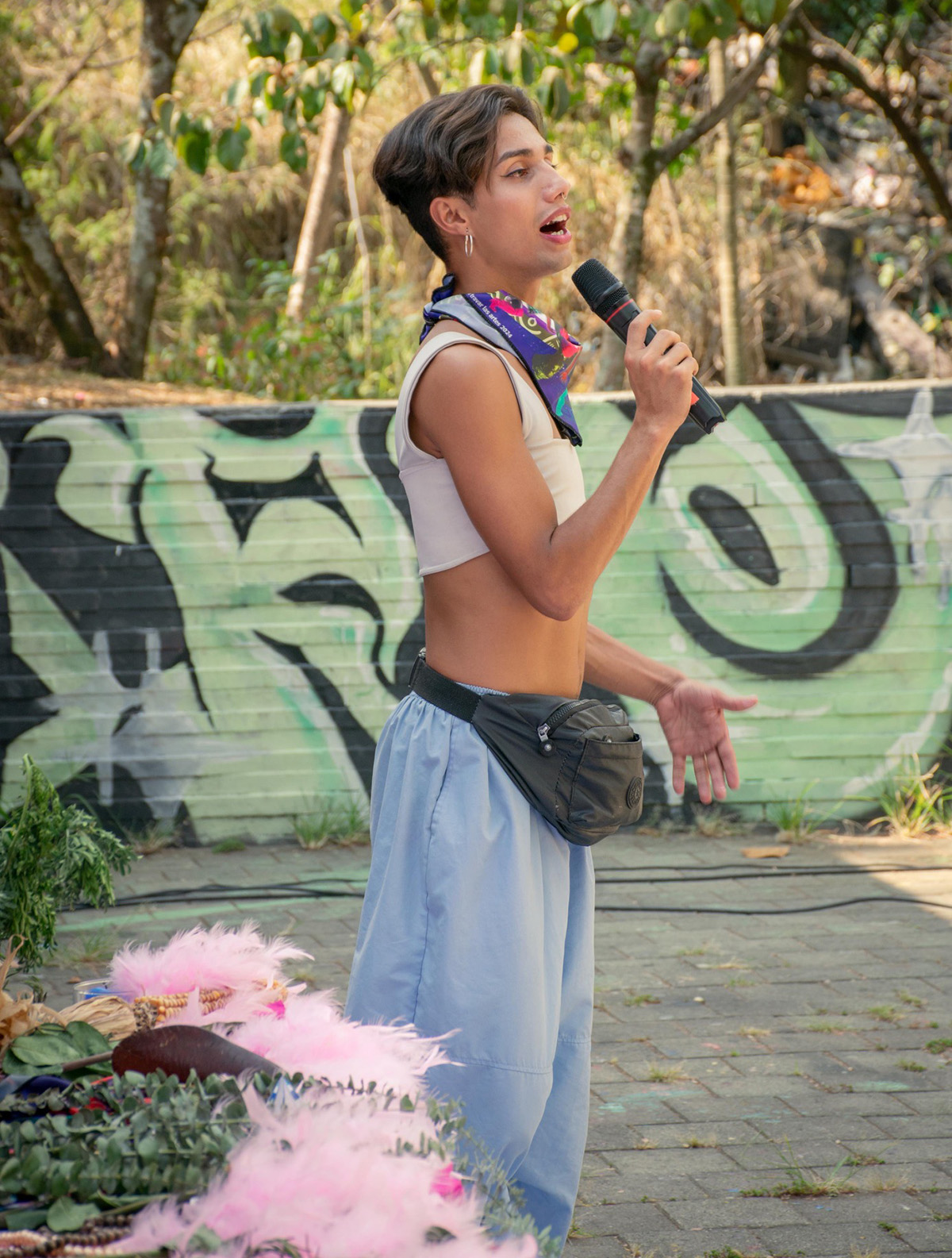
Ale llegó a la Red Popular Trans buscando un lugar seguro donde pudiera ser sin explicaciones ni condiciones. Lo encontró, y encontró también un espejo en el arte, una forma de reconocerse. Lo que empezó como curiosidad por la danza se volvió vocación y raíz. Hoy es licenciada en Danza, graduada con honores, y ha regresado a los mismos espacios que la vieron crecer para guiar a otres que, como ella, buscan un camino. En cada taller que facilita, Ale recuerda que antes de ser profesional fue una persona que necesitaba escuchar: “Aquí eres bienvenide”.
Esa frase resume la esencia de lo que aquí ocurre. La Red Popular Trans no solo impulsa el festival: organiza talleres permanentes, acompaña procesos de salud y bienestar, conecta artistas con oportunidades y teje redes de apoyo que se sostienen incluso fuera del escenario. Pajarapintadanza ha puesto el cuerpo, el movimiento y el espíritu al servicio de la pedagogía queer y decolonial, demostrando que el arte puede sanar, movilizar y transformar.
En estas redes, cada logro individual es una victoria colectiva. Cuando une bailarín trans pisa un escenario, cuando une pintore no binarie exhibe su obra, cuando une poeta cuir recita frente a su comunidad, toda la red respira con orgullo. El arte que nace aquí no es lujo, es necesidad; no solo inspira, sino que salva. Es viento que acaricia, raíz que sostiene, agua que fluye y fuego que enciende. El trabajo comunitario, constante y apasionado, convierte historias marcadas por el dolor en relatos de resiliencia y esperanza. Ale, la Red Popular Trans, Pajarapintadanza y Travar las Artes son prueba viva de ello, recordándonos que mientras haya cuerpos que bailen, voces que se alcen y manos que creen, siempre habrá un lugar para empezar de nuevo, y a veces, sin darnos cuenta, ese lugar se convierte en hogar.
Honduras
EPU: Honduras en deuda en violencia, niñez y diversidad sexual
Más de 70 organizaciones presentaron informes
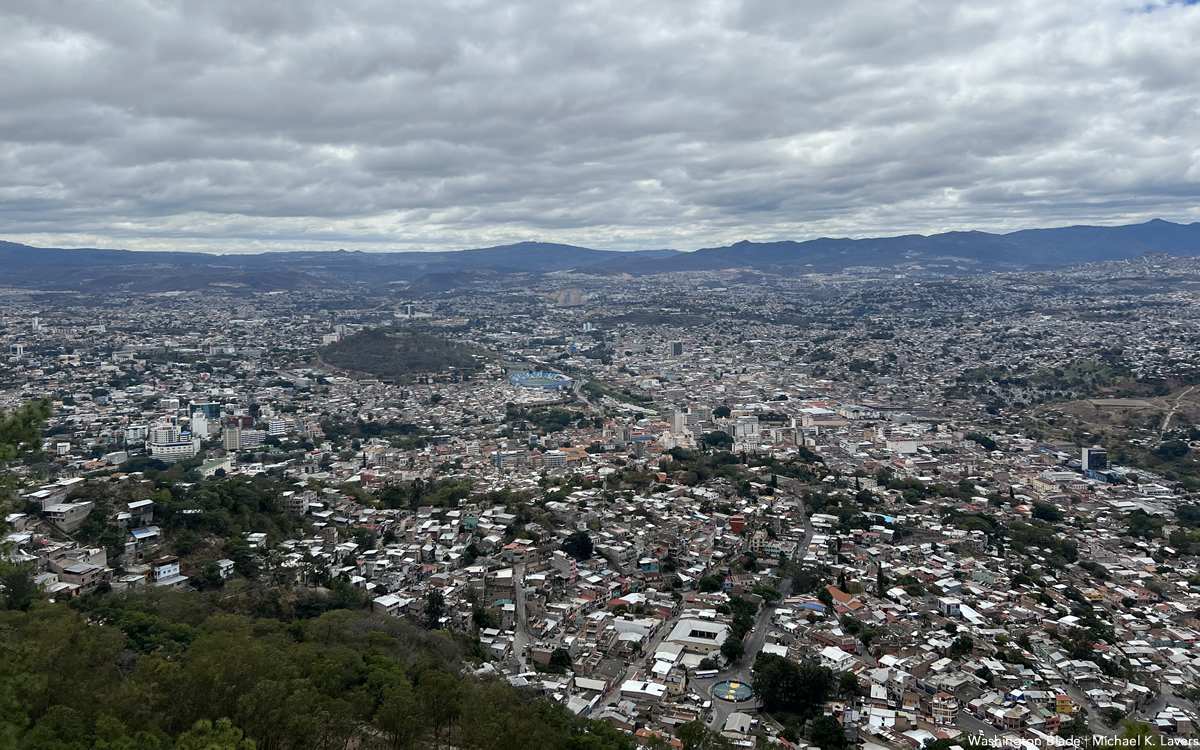
Por NAZARETH GÓMEZ | TEGUCIGALPA, Honduras — En el marco del Examen Periódico Universal (EPU), mecanismo del Consejo de Derechos Humanos de la ONU, organizaciones de sociedad civil en Honduras presentaron informes alternativos para evidenciar el incumplimiento de compromisos en materia de derechos humanos. Las recomendaciones al Estado serán revisadas en noviembre de 2025, cuando Honduras enfrente su evaluación internacional.
Durante el evento se compartieron siete informes temáticos sobre mujeres, niñez, diversidad sexual, personas defensoras, tierra, discapacidad y radios comunitarias. Las organizaciones exigen que las recomendaciones se traduzcan en acciones reales.
Violencia contra las mujeres y retrocesos legales
La Plataforma EPU Mujeres denunció que entre 2020 y 2024 se registraron más de 1,500 muertes violentas de mujeres y más de 8,600 evaluaciones médicas por violencia sexual. Solo hay tres juzgados especializados y 72 fiscales para más de 100 mil denuncias anuales.
También alertaron que no se ha aprobado la Ley Integral contra la Violencia hacia las Mujeres ni la Ley de Violencia Política. Ciudad Mujer opera solo en seis ciudades, dejando sin cobertura al 42.8 por ciento de las mujeres. “Seguimos exigiendo voluntad política para avanzar”, afirmaron.
Niñez: pobreza, violencia y abandono estatal
Organizaciones como Coiproden expusieron que el 66.8 por ciento de la niñez vive en pobreza y que siete de cada diez están en situación de pobreza multidimensional. Aunque se ha creado la Secretaría de Niñez y se aprobó una política nacional, aún no hay presupuesto suficiente ni liderazgo institucional claro.
Entre 2020 y 2024, más de 270 niñas, niños y adolescentes murieron por violencia. También se reportaron más de 800,000 alertas de desaparición, de las cuales el 30 por ciento corresponde a niñez. Las organizaciones exigen actualizar la política de prevención de violencia y fortalecer el sistema de protección.
Diversidad sexual: impunidad y exclusión
Desde 2009, más de 400 personas LGBTQ+ han sido asesinadas en Honduras, con un 93 por ciento de impunidad. Las organizaciones denunciaron la falta de avance en la aprobación de la Ley de Identidad de Género, el reconocimiento legal del matrimonio igualitario y la adopción de políticas inclusivas.
“El Estado mantiene patrones de discriminación institucional. No basta con crear políticas si no hay voluntad para implementarlas”, señalaron.
Solo existen seis fiscales a nivel nacional para investigar estos crímenes.
Territorio, pueblos indígenas y represión
El Centro de Estudios para la Democracia denunció que más de 1.8 millones de personas enfrentan inseguridad alimentaria grave. No se han hecho reformas para resolver la deuda agraria ni se han implementado sentencias a favor de comunidades garífunas.
También señalaron que, a pesar de existir un mecanismo de protección, Honduras sigue siendo uno de los países más peligrosos para las personas defensoras. “Se asesina, se criminaliza y no hay respuestas del Ministerio Público”, denunciaron.
Llamado urgente
Las organizaciones exigieron al Estado hondureño tomar con seriedad las recomendaciones del EPU.
Además, exigieron asumir compromisos reales con los sectores históricamente excluidos y garantizar el cumplimiento de los derechos humanos desde una visión integral y con enfoque de justicia.
Los informes completos están disponibles para consulta pública.



